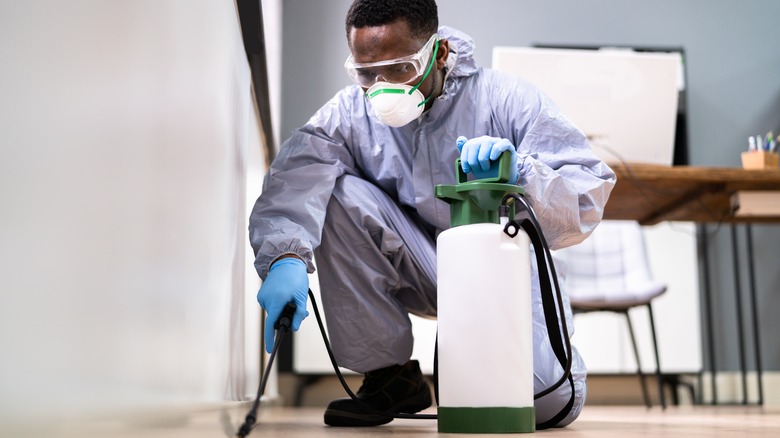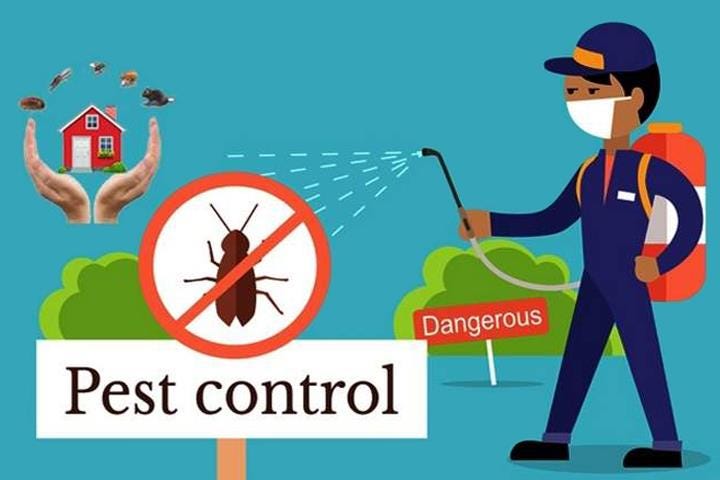Say Goodbye to Vermin: Pest Control Clovis Specialists at Your Service
Say Goodbye to Vermin: Pest Control Clovis Specialists at Your Service
Blog Article
Comprehending the Various Techniques to Pest Control: A Comprehensive Overview

All-natural Parasite Control Approaches
Utilizing environment-friendly methods such as companion growing and organic insect control is essential for properly taking care of insects in agricultural setups. Buddy growing involves expanding various plants in distance to prevent insects, improve nutrient uptake, and improve overall plant health and wellness.
Biological parasite control includes introducing all-natural predators or virus to manage pest populaces. Ladybugs, for example, feed on aphids, regulating their numbers without the requirement for chemical pesticides. An additional example is using Bacillus thuringiensis (Bt), a germs that targets specific insect bugs while being harmless to people, animals, and valuable bugs.
These eco-friendly approaches not only minimize the reliance on synthetic chemicals however also assist preserve biodiversity and soil wellness. By integrating all-natural pest control strategies right into agricultural techniques, farmers can accomplish sustainable bug management while minimizing unfavorable influence on the setting.

Chemical Insect Control Solutions
Along with natural bug control methods, the application of chemical bug control remedies plays a significant role in successfully taking care of pest populations in agricultural atmospheres. Chemical bug control services are formulated to target certain parasites that might cause comprehensive damage to crops. These remedies often include synthetic pesticides that are created to get rid of parasites quickly and effectively.
One of the essential advantages of chemical insect control options is their efficiency in regulating bug problems on a huge range. Farmers can use these remedies making use of numerous approaches such as splashing, airing out, or seed therapy to protect their crops from harmful bugs, weeds, and diseases. In addition, chemical pest control solutions are relatively easy to use and can provide rapid results, helping farmers safeguard their returns and reduce economic losses.
Nonetheless, it is vital to use chemical parasite control options judiciously to decrease prospective negative effects on the environment, non-target microorganisms, and human health and wellness. Correct application methods, adherence to safety standards, and normal surveillance are vital to guarantee the responsible use of chemical bug control options in farming methods.
Organic Insect Control Approaches
Biological insect control approaches leverage all-natural killers or microorganisms to take care of parasite populations in farming settings properly. This method supplies a green and lasting remedy to pest administration, lowering the reliance on synthetic chemicals and decreasing harm to the atmosphere. One typical organic control approach is the introduction of all-natural adversaries, such as ladybugs or parasitic wasps, to target certain parasites. These killers feed upon the bugs, aiding to regulate their populations naturally - pest control clovis.
An additional organic control method involves using microorganisms like fungi, bacteria, or viruses to contaminate and eliminate pests. These microbial representatives can be splashed on plants or introduced into the soil to battle numerous parasites without harming helpful bugs or other wildlife. Additionally, making use of scents to interfere with the breeding patterns of bugs is one more effective organic control approach. By disrupting their reproduction, this method aids to minimize bug populations without the need for chemical treatment. Generally, biological pest control strategies use a sustainable and article source targeted option to pest management in farming.
Integrated Insect Administration (IPM)
Integrated Insect Management (IPM) is a comprehensive technique that combines different parasite control techniques to effectively handle and decrease pest populations in farming systems. IPM concentrates on long-term avoidance of parasites through a mix of organic, cultural, physical, and chemical control techniques. By incorporating these various methods, IPM intends to lower reliance on chemical pesticides, reduce ecological influence, and promote sustainable bug monitoring practices.
One secret element of IPM is web link using biological controls such as natural predators, parasites, and virus to manage pest populations. This technique takes advantage of the power of nature to keep an equilibrium in between pests and their natural opponents without triggering damage to the setting.
In addition, IPM entails cultural practices like crop habitat, rotation, and sanitation control to produce undesirable problems for bugs and disrupt their life cycles. Physical controls such as composts, obstacles, and catches are likewise used to avoid bug invasions.
Physical and mechanical Parasite Control Methods
Using non-chemical methods, such as mechanical and physical look at this now parasite control techniques, is an important element of extensive pest monitoring methods, developing upon the foundation of Integrated Pest Monitoring's alternative method. Mechanical pest control entails using physical barriers or catches to prevent bugs from accessing and damaging crops or frameworks. This method can consist of methods like installing displays on windows, making use of row covers in farming, or employing sticky catches to catch pests.
Physical insect control approaches, on the other hand, concentrate on directly eliminating bugs through physical methods. For instance, making use of heat therapies to eliminate bed pests or vacuuming up insects like ants or spiders can be reliable ways to take care of infestations without the usage of chemicals. By integrating these mechanical and physical parasite control methods into an Integrated Bug Administration strategy, individuals and specialists can lower dependence on chemicals while still properly reducing and managing pest populaces damages.
Final Thought

In enhancement to natural pest control techniques, the application of chemical parasite control services plays a considerable role in properly handling pest populaces in farming atmospheres.One of the crucial benefits of chemical pest control remedies is their effectiveness in managing bug invasions on a large range.Integrated Pest Management (IPM) is a comprehensive approach that combines different parasite control techniques to successfully handle and decrease pest populaces in agricultural systems.Using non-chemical methods, such as mechanical and physical insect control strategies, is an essential facet of comprehensive insect monitoring techniques, developing upon the foundation of Integrated Pest Monitoring's all natural strategy. By integrating these physical and mechanical bug control methods right into an Integrated Pest Administration plan, individuals and professionals can reduce dependence on pesticides while still effectively reducing and taking care of pest populations damages.
Report this page